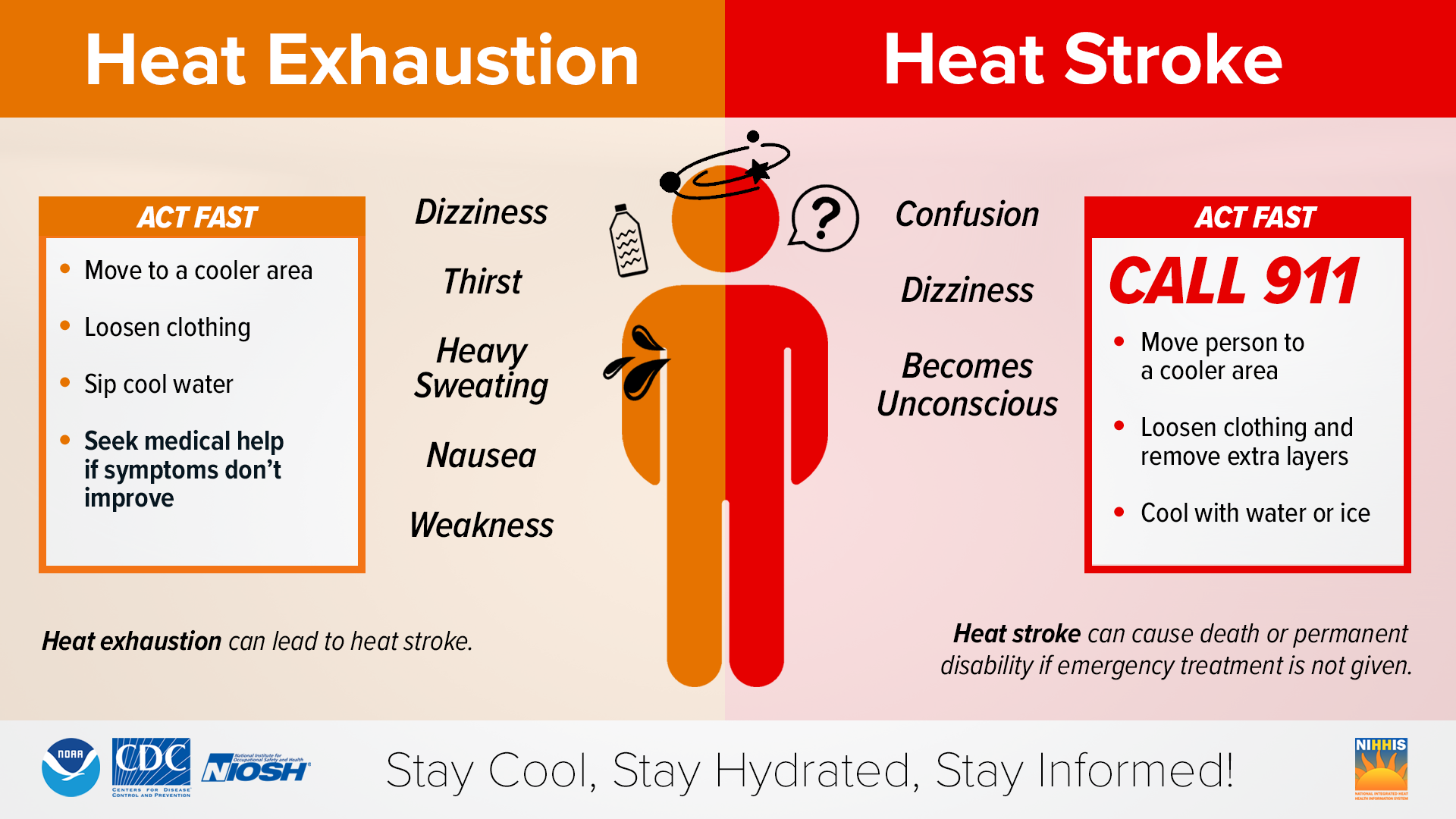HEAT HEALTH
Extreme heat can be dangerous and can trigger a variety of heat stress conditions, such as heat stroke. Not like the stroke we usually think of, heat stroke is the act of being struck by heat. It occurs when the body becomes unable to control its temperature.
Small children, the elderly, and other groups have higher risk for heat-related illness. Risk factors include:
- Age. Your ability to cope with extreme heat depends on the strength of your central nervous system. In the very young and in adults over 65 the body is less able to cope with changes in body temperature. Both age groups usually have difficulty remaining hydrated, which also increases risk.
- Exertion in hot weather.
- Sudden exposure to hot weather. You may be more susceptible to heat-related illness if you're exposed to a sudden increase in temperature. Limit activity to allow yourself to acclimate to the change. It can take days to weeks to fully acclimate.
- A lack of air conditioning. Fans may make you feel better, but during sustained hot weather, air conditioning is the most effective way to cool down and lower humidity.
- Certain medications. Some medications affect your body's ability to stay hydrated and respond to heat. Be especially careful in hot weather if you take medications such as vasoconstrictors, blood pressure beta blockers, diuretics or antidepressants and antipsychotics.
- Certain health conditions. Certain chronic illnesses, such as heart or lung disease, might increase your risk of heatstroke. So can being obese, being sedentary and having a history of previous heatstroke.
Take steps to prevent heatstroke:
- STAY COOL – Air-conditioning is the number-one protective factor against extreme heat. Wear loosefitting, lightweight clothing. Wearing excess clothing or clothing that fits tightly won't allow your body to cool properly.
- DON’T BURN –Protect against sunburn. Sunburn affects your body's ability to cool itself, so protect yourself outdoors with a wide-brimmed hat and sunglasses and use a broad-spectrum sunscreen. Apply sunscreen generously, and reapply every two hours — or more often if you're swimming or sweating.
- STAY HYDRATED – and avoid strenuous outdoor exercise during heat alerts. Staying hydrated will help your body sweat and maintain a normal body temperature.
- BE AWARE OF YOUR MEDICATIONS – Be on the lookout for heat-related problems if you take medications that can affect your body's ability to stay hydrated and dissipate heat.
- NO FREE PARKING – Never leave anyone in a parked car. This is a common cause of heat-related deaths in children. It's not safe to leave a person in a parked car in warm or hot weather, even if the windows are cracked or the car is in shade. When your car is parked, keep it locked to prevent a child from getting inside.
- SHIFT INTO LOW GEAR – Take it easy during the hottest parts of the day. If you can't avoid strenuous activity in hot weather, drink fluids and rest frequently in a cool spot. Try to schedule exercise or physical labor for cooler parts of the day, such as early morning or evening.
- GET ACCLIMATED – Limit time spent working or exercising in heat until you're conditioned to it. People who are not used to hot weather are especially susceptible to heat-related illness. It can take several weeks for your body to adjust to hot weather.
- ACT QUICKLY – Act quickly if you notice symptoms of overheating.
Heatstroke signs and symptoms include:
- High body temperature.
- Altered mental state or behavior. Confusion, agitation, slurred speech, irritability, delirium, seizures and coma can all result from heatstroke.
- Alteration in sweating. In heatstroke brought on by hot weather, your skin will feel hot and dry to the touch. However, in heatstroke brought on by strenuous exercise, your skin may feel dry or slightly moist.
- Nausea and vomiting.
- Flushed skin. Your skin may turn red as your body temperature increases.
- Rapid breathing. Your breathing may become rapid and shallow.
- Racing heart rate. Your pulse may significantly increase because heat stress places a tremendous burden on your heart to help cool your body.
- Headache. Your head may throb.
- Take action to cool the overheated person while waiting for emergency treatment. Go to shade or indoors. Remove excess clothing. Cool the person with whatever means available, such as put in a cool tub of water or a cool shower, spray with a garden hose, sponge with cool water, fan while misting with cool water, or place ice packs or cold, wet towels on the person's head, neck, armpits and groin.

Comments
Post a Comment